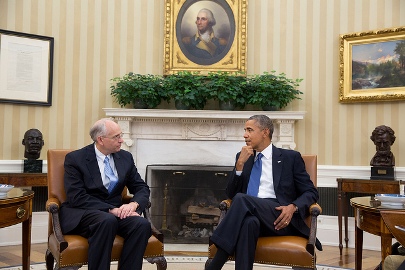Obama makes long-awaited appointment for post of Sudan special envoy
August 28, 2013 (WASHINGTON) – Donald Booth, former ambassador who served in different parts of the African continent, has been named special envoy for Sudan and South Sudan, the White House announced on Wednesday.

The diplomat who served in Ethiopia, Zambia and Liberia “has extensive experience promoting peace and prosperity across the African continent”, the White House added.
Booth will work with the African Union (AU) and the international community to facilitate the resolution of pending issues between the two countries, including Abyei referendum and the disputed border zones, the statement said in part.
He also seek to aid efforts aimed at ending the ongoing conflicts in Darfur, Southern Kordofan, and Blue Nile “as part of a holistic solution to Sudan’s human rights, humanitarian, and governance crises”, the White House underlined.
“And he will urge South Sudan to stay focused on protecting its people, meeting their needs, and realizing their aspirations for a more peaceful, prosperous, and democratic future”.
Booth will succeed Princeton Lyman who resigned in late 2012 for what sources said was due to health reasons.
Obama’s administration delay in picking a new envoy drew criticism from some US lawmakers including Representative Frank Wolf who wrote several letters to Obama urging him to swiftly pick a successor.
Wolf accused the Obama administration of pushing the crisis in Sudan to the bottom of his priorities.
Also, a coalition of Sudan activist groups in Washington known as Act for Sudan sent a letter to Kerry last March imploring him not to nominate former US ambassador to Khartoum Timothy Carney for the job citing what they perceived as his sympathetic views with the Sudanese government.
They recalled Carney’s testimony in 2009 at the U.S. Congress in which he voiced his opposition to efforts aimed at isolating Sudanese president Omer Hassan al-Bashir who has been indicted for war crimes by the International Criminal Court (ICC).
He proposed instead to defer the ICC warrant, sending an ambassador to Khartoum and removing Sudan from the state department’s list of state sponsors of terrorism.
The Sudan activist group known as Enough issued a statement today lauding the pick by Obama.
“The appointment of a seasoned diplomat like Don Booth to this critical position will enhance U.S efforts to promote peace within Sudan and between Sudan and South Sudan. We urge Special Envoy Booth to push for a comprehensive, internationally-backed peace process in Sudan which does not segment the conflicts across border regions—Darfur, Abyei, South Kordofan, and Blue Nile State—but addresses them holistically, and includes greater engagement with opposition groups working toward democratic transformation in Sudan” Enough Project Executive Director John C. Bradshaw said.
Despite intense regional and international pressure little progress was made in resolving Sudan’s internal conflicts or its longstanding dispute with South Sudan.
Khartoum and Juba have long been at loggerheads over the accusations that the former is backing rebels in Sudan’s South Kordofan and Blue Nile border states. Juba denies this charge.
Last June, Sudanese president Omer Hassan al-Bashir ordered closure of pipelines carrying oil from landlocked South Sudan over these allegations. South Sudan has just started pumping oil after a year of suspension following a dispute with Sudan over transit fees.
China and the AU managed to convince Bashir to delay the decision till early Sepetmber while they work on verifying claims of rebel support and getting the two sides to agree on borders security and demilitarized zone.
But talks appeared to have hit a snag with Khartoum accusing Juba of non-cooperation in the jont talks held so far.
Sudan has long held that conclusion of security arrangements must precede implemntation of other deals signed last year such as ones related to citizenship and trade.
Another growing concern for the US in recent months is the growing insecurity in South Sudan and particularly ghe fighting in Jonglei state which has led to mass killings and report of abuses by government troops.
Adding to this is a political crisis within South Sudan’s ruling party that led to the sacking of VP Riek Machar and suspension of few other senior officials pending investigation into financial and political alleged wrongdoings.
(ST)
